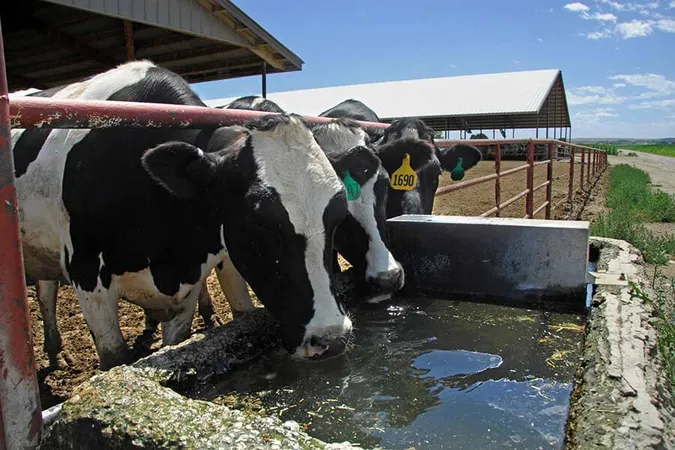
Idaho's Dairy Industry Faces Bird Flu Quarantine: What You Need to Know!
2024-11-25
Author: Yan
BOISE – The Idaho dairy industry is currently grappling with a severe bird flu outbreak that has placed three dairies under quarantine.
The situation has escalated since Idaho’s initial cases last spring, which marked the rapid spread of the virus throughout the southern region of the state. This outbreak poses significant concerns not only for livestock health but also for the billion-dollar dairy industry essential to Idaho’s economy.
Quarantine Measures
As of this week, state officials confirmed that quarantine measures are in effect for two dairies located in the Treasure Valley, including Boise, and one in the Magic Valley of south-central Idaho. State Veterinarian Scott Leibsle expects that one of the quarantined herds may soon resume normal operations if it passes another health inspection of its milk supply. Overall, a staggering 35 dairies have faced quarantine since the onset of bird flu in Idaho.
Current Recovery and Challenges
Despite the rapid spread of infections, the state has seen some recovery, with affected herds beginning to stabilize. However, 41 individual cases of bird flu in poultry have been reported since March, a stark reminder of the widespread impact of this virus across agricultural sectors.
What's Really Happening?
Idaho has opted not to publicly disclose the names of the quarantined dairies, likely due to a reluctance among farmers to report positive cases and provide easy access to regulatory officials. Comparatively, California has experienced over 200 confirmed cases of bird flu among its dairies in just the last month—a rapid outbreak that has overwhelmed their response systems. Leibsle emphasizes that Idaho's experience has positioned them to better manage the situation with the knowledge gained from earlier outbreaks.
Interestingly, while Idaho reports low numbers of infected cattle, stakeholders like Leibsle suggest there could be an increase in immunity among cattle exposed to the virus during earlier waves. "Currently, we see cattle shedding the virus while showing no visible symptoms," he noted, highlighting the complex transmission routes of bird flu which can include contaminated surfaces and respiratory droplets.
The Stakes: An Economic Overview
Dairy farming is the backbone of Idaho's agricultural sector, employing over 45,000 individuals and producing an annual revenue of approximately $4.2 billion. With 376 dairies operating in the state, milk production saw a slight dip of about 3% earlier this summer, but market impacts remained minimal as most dairy farms returned to full operational capacity quickly.
Despite regulatory challenges, experts are increasingly concerned about the potential under-reporting of cases in Idaho. Dr. David Pate, a healthcare leader, pointed out that many farm workers, who predominantly come from immigrant backgrounds, may avoid seeking medical assistance due to job insecurity or financial constraints.
Health Risks and Stability
While Idaho has yet to report human cases of bird flu, neighboring states have confirmed infections in individuals exposed to infected poultry and cattle. The Centers for Disease Control and Prevention (CDC) maintains that the risk to public health is low and that there's no evidence of human-to-human transmission. Caution is advised for those in direct contact with affected animals, although stringent testing protocols are not yet mandated.
Moving Forward: Tightening Regulations and Future Prospects
In a bid to enhance surveillance of the disease, the USDA plans to roll out a mandatory testing program for all dairies, expected to start either in December or January. This initiative could require significant logistical effort, particularly for larger farms with vast herds.
Milk safety remains a top priority, with pasteurization effectively neutralizing the virus. Leibsle assures that despite current challenges, food safety protocols are robust. "We are optimistic," said Rick Naerebout from the Idaho Dairymen’s Association, "that a vaccine for cattle may soon be developed, mirroring the human approach to flu vaccinations."
As the dairy industry navigates these turbulent times, stakeholders remain hopeful that proactive measures will bolster herd health and protect one of Idaho’s economic cornerstones.


 Brasil (PT)
Brasil (PT)
 Canada (EN)
Canada (EN)
 Chile (ES)
Chile (ES)
 España (ES)
España (ES)
 France (FR)
France (FR)
 Hong Kong (EN)
Hong Kong (EN)
 Italia (IT)
Italia (IT)
 日本 (JA)
日本 (JA)
 Magyarország (HU)
Magyarország (HU)
 Norge (NO)
Norge (NO)
 Polska (PL)
Polska (PL)
 Schweiz (DE)
Schweiz (DE)
 Singapore (EN)
Singapore (EN)
 Sverige (SV)
Sverige (SV)
 Suomi (FI)
Suomi (FI)
 Türkiye (TR)
Türkiye (TR)